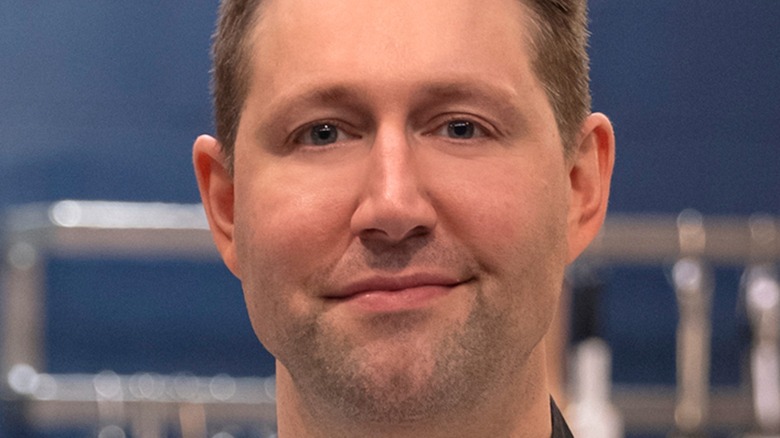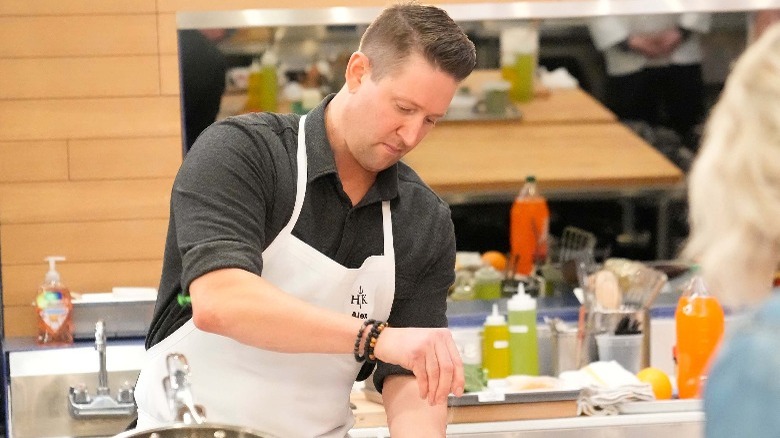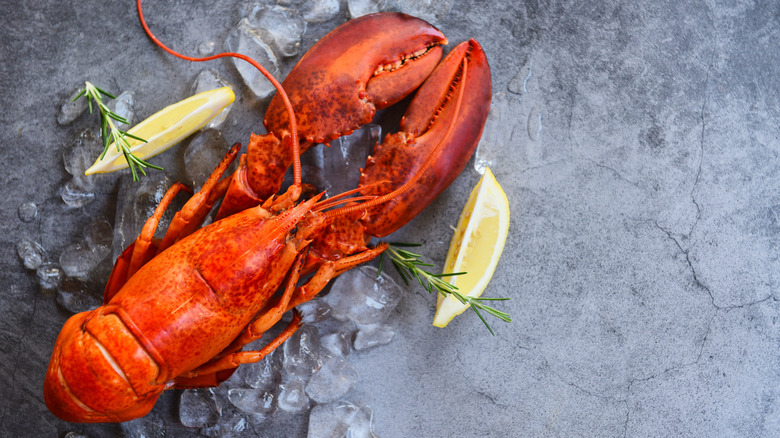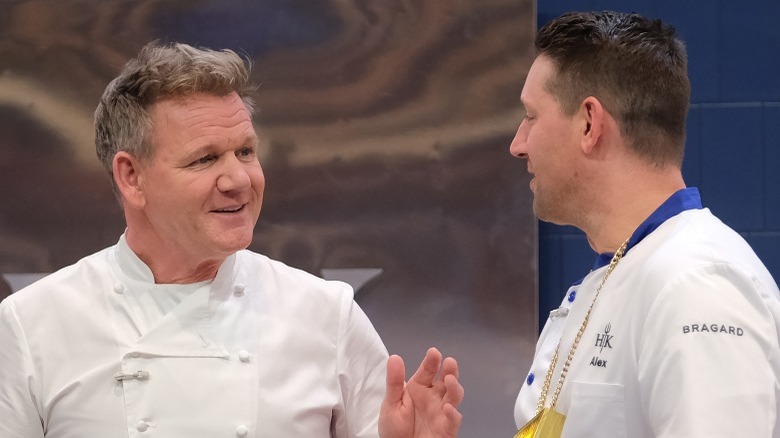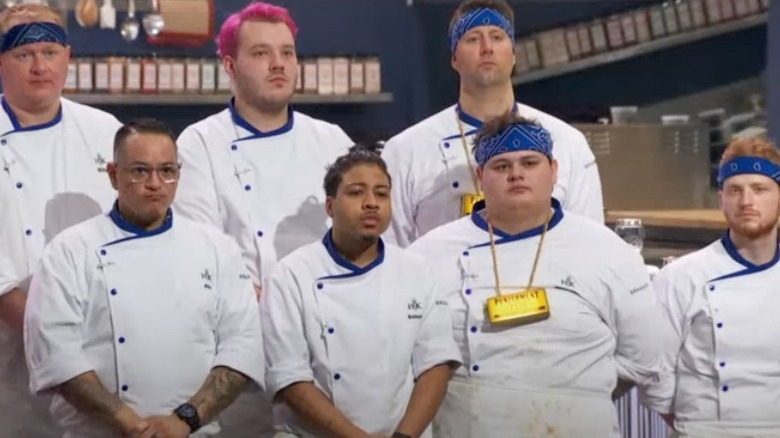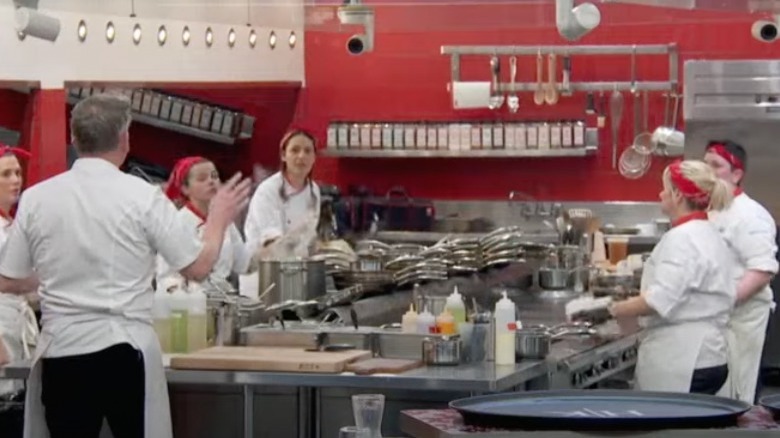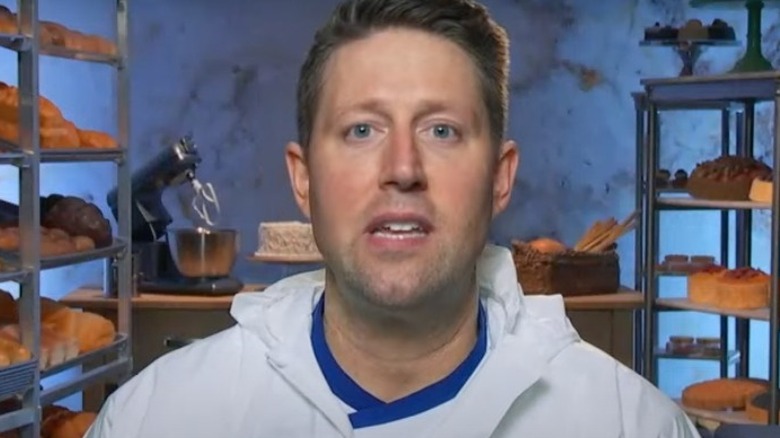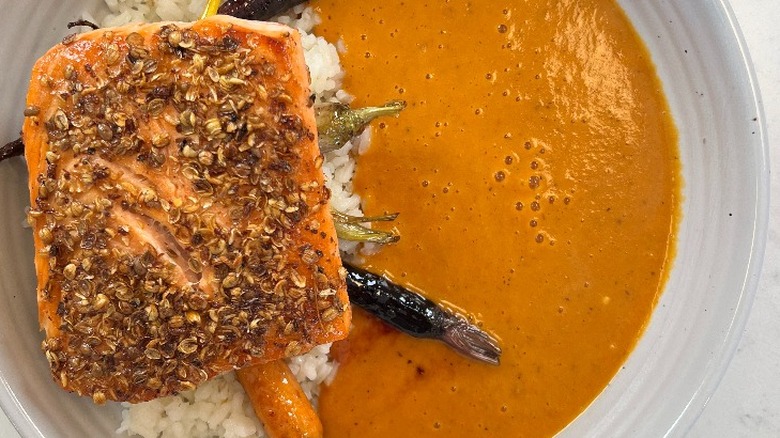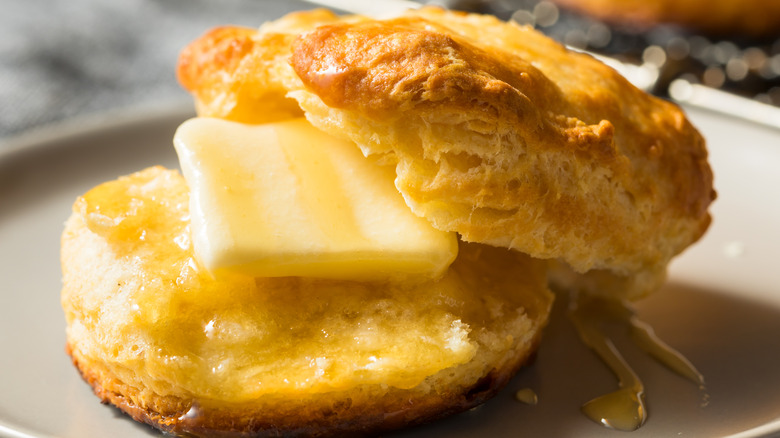Alex Belew Aims For Perfection In Hell's Kitchen - Exclusive Interview
Alex Belew wishes he'd brought more Benadryl to "Hell's Kitchen." Who wouldn't when running on 90 minutes of sleep a night? Belew does a remarkable job working through exhaustion — at least through the first half of the season. Over Episodes 1 and 2, Gordon Ramsay all but rhapsodizes over Belew's signature salmon and General Tso's-inspired chicken wings, even as the rest of the 40-somethings flounder. During Episode 3, Belew is the first of the pack to break down a lobster. He does so, magnificently, although he swears to Mashed that he'd never done it pre-competition.
The chef may or may not come away with a job offer; there'll be no spoilers in this interview. Belew's early leadership in the competition did, however, earn him something else: respect and friendship among the 20-somethings, whom the Tennessee-based chef has been catching up with via Instagram Lives after each of his season's episodes airs. In this exclusive with Mashed, Belew gives us a MasterClass in the art of fish cookery and buttermilk biscuits, opens up about "Hell's Kitchen" rivalries, and adds to our arsenal of unforgettable Gordon Ramsay anecdotes.
Alex Belew quit cooking. This is what brought him back
After graduating culinary school you quit cooking pretty quickly because of burnout. What brought that burnout on?
The whole time I was in culinary school, I would wake up at 4:00, 4:30 in the morning and school started at 6:00. I would get to school at 6:00 a.m. and get done around 4:30 p.m., and then I would go straight to work. I worked 45 minutes from school and I would work from 6:00 p.m. until 11:00 p.m. and then I would get home. I did that for 18 months straight, every single day. If this is what it is, man, I'm tired. I'm tired of working 18 hours a day. I graduated and I was like, "I think I'm done." My wife was like, "Oh, great, thanks. It's a good thing culinary school's so cheap."
What reignited your spark for being in the kitchen?
I was working as a musician for a while, and I got a phone call to be a culinary teacher at a high school. The job was a dream job for a chef. You work 7:30 in the morning until 3:00 in the afternoon. You don't work weekends, you don't work holidays, you don't work during the summer, and I get paid [about] a flat $35,000. That job honestly changed everything for me. I loved the students. The food budget was trash. I had $1,500 a year to buy groceries for five classes to cook every single day.
It was ridiculous, but by year two, I had gotten a phone call from someone at the National Restaurant Association who deals with something called ProStart. They asked if I'd like to compete. They said, "Basically, you get a team of four students, they build out a menu. They have to do precision knife cuts, break down a chicken, and then cook four courses in 60 minutes with no electricity."
They only gave us three or four weeks before the actual competition took place to get ready. I picked my four best students. We drilled down every single day. We were breaking down chickens every single day, working on knife cuts every single day, building up this menu, breaking down the food costs. We went and competed in state and we won ... it was really cool to make our culinary program number one in the state.
That job transformed everything, because it forced me to teach myself new things so I could teach these kids new things. To be able to come up with enough material to teach every single day and still be passionate and energetic and not boring these kids to death, that's a lot of content to have to come up with. You can't make rice every single day. You can't open a box of brownie mix and say, "Stir that together. Today, you're making box brownies."
The trick to winning Gordon Ramsay's lobster challenge
On "Hell's Kitchen," Gordon Ramsay teaches you how to break down a lobster. You'd never done that before, but he gave you high praise.
I'm right outside of Nashville. I'm very landlocked. Anytime that we've used crab — and I don't think I've ever worked at a restaurant where we sold lobster tails, unless it was back in the early 2000s when I worked at a corporate chain and they had lobster tail on a steak, but all that stuff is already brought in. It's taken apart. It's mostly all prepped. I've never really had to deal with that.
Chef [Ramsay] did that in four minutes with his demo, which is lightning fast if you've never seen it before. You're watching it trying to absorb all the details. He gave us 10 minutes to start with a raw live lobster, cook it, and then take it apart. I was the first one done. I had 90 seconds left, and I don't think I can do it again. I retain really fast, but then I purge if I don't need it. I have a feeling that if you asked me to do it right now, I'd be like, "Where do I start?"
Do you have advice for anybody breaking down a lobster for the first time?
You need to make sure [with] the claws and the tail that you blanch them long enough that the meat separates from the shell, because if you don't leave it in the water long enough, the proteins don't contract, and the meat will still stick to the shell. As you're trying to break it open, you'll tear the meat, because it's still stuck to the outside.
Why Alex Belew was sleep deprived on Hell's Kitchen
To get ready to go to "Hell's Kitchen," you had a week between Christmas and New Year's. You had to sell a company. What was the packing process like? Is there anything you wish you would've taken with you?
Yes. They called me maybe two or three days before Christmas and told me I was flying out January 2 or 3. My restaurant had pivoted from a fine dining restaurant to a meal prep restaurant. It was me and one other lady. We could handle it all. She had decided to take a job as a flight attendant, so she was moving on. I had to figure out, "What am I going to do with this building? I still have to pay the bills and I'm going to be gone for God knows how long, so what do I do here?" I tried to find someone to take over the space and purchase the company and take it on their own. I found someone and it's gone terribly, terribly bad.
They were pretty detailed with what we needed to bring. At first, we had to quarantine in the hotel room for 14 or 17 days ... More Benadryl. I wish I would've bought more. I would take a Benadryl at 9:00 in the morning to go to sleep, just so I could try to pass the time. I don't do well in cooped up situations. You're stuck in this room, you can't go work out, you can't do anything. That was tough. It's a mental game.
[Overall], I felt like I was pretty prepared. I had earplugs, but I can't really sleep with earplugs because my ears ring from being a musician for so long. I was either going to listen to Billy's CPAP machine or the inside of my head ringing. Either way, it was a pretty terrible sleep situation. I probably slept 90 minutes a night the times when I was there.
Alex Belew talks rivalries with fellow Hell's Kitchen contestants
In a lot of your post-episode recaps, your rivalry with Billy comes on pretty strong. At the end of Episode 5, it looks like you two are about to go at it. Can you give us the inside story?
I didn't take it personally after the show. Billy has carried it on since we left. He's still mad and I'm trying ... I followed him on Instagram for a while, and he never followed me back. I was like, "Well, screw you, Billy," and I unfollowed him. He has talked some s*** about me on his Facebook page. I've not done that about him. I've talked about the whole CPAP thing, because that's good TV.
When I'm in the kitchen, especially in "Hell's Kitchen," I was there to do the absolute best job that I could. I wanted to win. This was not a joke. I was there and he was — There's not even a word to describe it. It was just too much for me. I don't need someone hyping me up like I'm in a football game. I'm trying to get dialed in and he's like, "Let's go, bro. Let's go." I'm like, "I need you to chill out, bring it down." Everybody was like, "Calm down, Billy." He was a lot. Everybody in America can see that he's a lot.
What Hell's Kitchen's 20-somethings taught Alex Belew
You talk about the Blue Team being at a disadvantage because food has changed so much over 20 years and young people have developed new techniques. What new techniques did you pick up, if any, while you were on the show?
Working around Sakari and Daphne and Alejandro and Vlad and Brett, they were more keen to taking big risks. For us older folks — I'm lumped into that group now — we felt like we were going to play it safe. They're cranking out fresh tortellini and poaching the oysters and cream and making oyster fat. Alejandro is busting out all these Mediterranean flavors ... I'm from Nashville. I don't use a lot of labneh and Calabrian chilies and all these wild flavors. That's not something that I've ever had to do.
It was taking on the idea of being a bit of a more risk-taker, trying to be more creative while still staying in my wheelhouse and executing properly. Watching them make fresh pasta in 30 minutes and then it being utilized in a dish, that's not generally something that's done. They say when you make fresh pasta, you need to let it rest for 45 minutes to an hour. Then, you roll it out. Then, you fill it. Then, you cook it. Then, you salt. That's a process. They're making fresh pasta like Sonic the Hedgehog and boom, it's done. I'm over here with my baked potato, basically.
It's the way they operate. They work in environments where they push the envelope. Sakari came from 11 Madison Park. That's some real s***. It was fun to be around those kids and absorb their energy and their creativity and it was fun that we were all pushing for the same thing.
How Alex Belew became a Hell's Kitchen frontrunner early on
A lot of the people you're talking to on episode recaps seem to pick you out as a leader. Was that a feeling that you had about yourself throughout, at least, the early part of the competition?
When we walked in, we had no clue who else was going to be there. I didn't know if I was going to be the strongest, weakest, middle of the road ... I was trying to maintain my composure and be myself to the best of my ability. I'm a dad. I've run my own restaurant. I've been in those leadership positions for a long time. It's something that comes naturally at this point. The last two or three years have forced me to grow in ways that I would not have normally had to grow. I've been put in some really bad situations from the pandemic and owning a small business. It's been crazy.
It did not hurt me at all from a leadership perspective, the fact that I maintained my composure in the first three or four episodes. I had absolutely dominated and I didn't even realize I was doing it. I was trying to operate and operate well. People started viewing me as a threat and a leader based off what I was producing.
It came naturally and organically, based on my level of excellence that I was putting out there. If I had been flopping every service and flopping every challenge, it wouldn't have mattered if I was giving out advice like Tony Robbins. They would've been like, "You can't execute. You might be able to talk this big game, but you can't put your money where your mouth is." It is a bit of walking the walk and talking the talk, and I was able to do both in the first few episodes.
How to cook Gordon Ramsay-approved salmon
Gordon Ramsay gushes about your signature dish — "A spice crusted salmon served with Carolina gold rice, maple glaze, Aleppo carrots and a chorizo broth." You've made that recipe available. What are the keys to getting a salmon right?
One thing that I swear by, almost every time I cook fish, is to dry cure the fish for 15 minutes beforehand. It makes it much harder to overcook it. If you've ever overcooked salmon, you'll see some white liquid coming out — the albumin coming out of the sides. If you dry-cure the salmon, that will keep that from happening. The albumin and protein will stay intact.
I do a mixture of 60% salt and 40% sugar, completely coat the filet, sit it on a cooling rack about 15 minutes, rinse off an ice water, pat it dry. That does a few things. It seasons it. It gets rid of any residual moisture that the fish may be holding, it firms up those proteins, and keeps you from overcooking it. That's almost like a hack to do that to a piece of fish.
Then, adding that layer of crust ... Because of the fattiness of [salmon], it can stand up to some really bold spices. I made that Szechuan peppercorn and coriander crust on it. Immediately, when you put in your mouth, those Szechuan peppercorns are singing. It's hitting your pallet. It's got that tingly effect. You're getting the richness from the salmon.
It was about cooking it on its crust, about 60%, 65%, flipping it over, adding butter and basting for a minute. Then, let it rest, just like a steak. Hit it with some lemon juice and it's perfectly pink throughout. There's nothing better than a perfect piece of cooked salmon and there's nothing worse than ... It [can turn] into cat food real quick. You might as well open a can of skipjack tuna.
It was about presenting a dish that was composed but filling and had components that both contrasted with each other and complimented each other. I know I just served rice to Gordon Ramsay, but I served the best rice in the world in my opinion, which is Carolina Gold rice. The starch content is different. The flavor is aromatic and delicious. It's not a regular 99 cent bag from the grocery store. It's 12 bucks a pound. It's delicious goodness.
It's so good. It's not cheap, and you have to keep it in your freezer after it's open, but it's so good. It's so aromatic. It's so light and fluffy. It's amazing. It eats like buttered popcorn.
Chef told me, "I don't know if you can cook or not, but you can sell the s*** out of anything." It's using adjectives. You got to learn how to use adjectives.
Alex Belew's Gordon Ramsay stories
You say there's a side to Ramsay that's not shown on camera, that he's often very patient and does one-on-ones with contestants. Is there a moment in particular that stands out to you?
His brain, I don't know what speed it plays on, but it's not normal. It's ramped up times 10, and when he's bouncing back and forth from kitchen to kitchen, he's got so many fires going. I don't even think he knows what he's accomplishing when he is doing it. At one point, I was cooking a piece of halibut and he ran over to my station. He's like, "We do it like this, do it like this, put it like this, and then it'll do like this." I was like, "Oh, awesome, cool. Thanks so much."
He runs to the Red Kitchen and does something. Maybe four minutes goes by, and he runs back over and he is like, "What are you doing? No, do it like this." He showed me two different methods to get exactly a great piece of fish in four minutes. I was like, "Which one do I do? Is one of these wrong?" He's a plethora of information. He's forgotten more than I will probably ever know.
What does it feel getting kicked out of the kitchen by Gordon Ramsay?
How do I put that into words? Really disappointing. That feeling that you had as a kid when your parent looked at you and said, "I'm disappointed." Oh, is that acid reflux? That doesn't feel good. There was one part where it was maybe Episode 3 where we got kicked out and it was the 40th anniversary couple that had flown from England and they had planned it for months. They flew over to America, booked their dinner, and we could not get their food out. We got kicked out.
I remember he kicked us all out to the dorms and then I stood there in the hallway, contemplating. Do I go back in there and say, "Can I please finish this ticket?" That would've gone one of two ways. "Good man. I appreciate you trying," or "Get the f*** out." I didn't want that to happen so I turned around and walked away. It was heartbreaking. I will also say this. So far, every time it's happened, I always knew it wasn't my fault. I had this devil-angel thing going on where it was like, "Act sad, but it wasn't you." I was really pissed off, but in my mind I was going, "I'm not the one going home."
Alex Belew's MasterClass in buttermilk biscuits
Thanksgiving is coming up. Word on the block is you're good at making buttermilk biscuits. Is that true?
I had a very southern upbringing. My grandparents owned a general store. My grandmother wrung chickens' necks and killed them — raised on a farm, family raises Walking horses. I come from rural Tennessee. My grandmother made the best food I ever had. I could never figure it out how she did it. I worked on my buttermilk biscuit recipe for five years, which sounds so stupid, because most all recipes are naturally the same. There's variations slightly, but it really comes down to technique. In 2016 and 2017, I won the International Biscuit Festival.
What's the number one thing we can do to up our buttermilk biscuit game?
Make sure that your butter is frozen and grate it on a cheese grater. That's the best tip. If you try to break it off in pieces and have pea sized pieces, it's not consistent. You need frozen butter that's been grated on the large holes of a box grater and make sure everything is just super duper cold. I never use a rolling pin on my biscuits. Even if I'm making 96 in a batch ... It's all by hand. I stir it all together in a bowl until it's in a big shaggy mess. I put it onto my workstation and I basically pat it out until it's about a half inch thick. Then I letter fold over, pat it down, turn it, pat it out, letter fold. I basically fold it over itself four to six times creating layers and laminating the dough, and then I use a square cutter because there's less waste.
New episodes of "Hell's Kitchen" air Thursday nights at 8:00 p.m. ET on FOX. To keep up with Alex Belew, visit his website and subscribe to his mailing list!
This interview has been edited for clarity.
